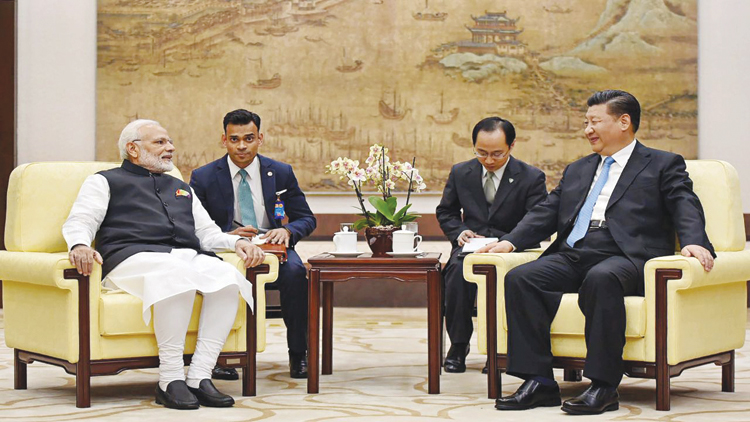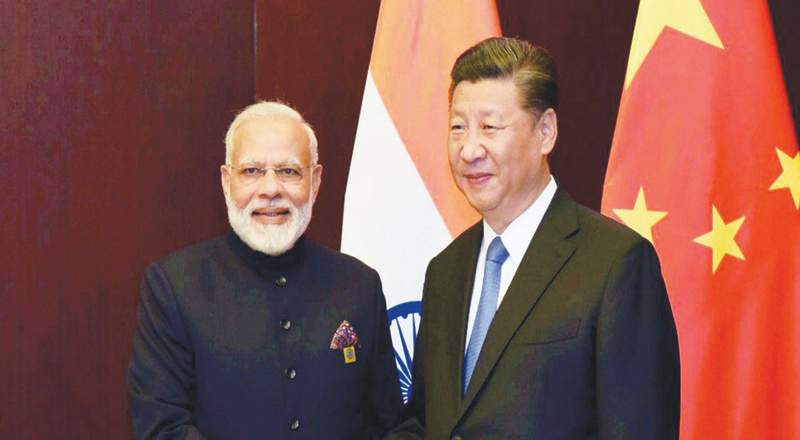PM Narendra Modi and Chinese President Xi Jinping held one-on-one talks on the second day of a two-day informal summit in Wuhan, aimed at improving bilateral relations –
Prime Minister Narendra Modi and President of China, Xi Jinping held their first Informal Summit in Wuhan on April 27-28, 2018, to exchange views on overarching issues of bilateral and global importance, and to elaborate their respective visions and priorities for national development in the context of the current and future international situation. They believe that the simultaneous emergence of India and China as two large economies and major powers with strategic and decisional autonomy, has implications of regional and global significance. They shared the view that peaceful, stable and balanced relations between India and China will be a positive factor for stability amidst current global uncertainties.
The two leaders also agreed that proper management of the bilateral relationship will be conducive for the development and prosperity of the region, and will create the conditions for the Asian Century. To this end, they decided to strengthen the Closer Development Partnership in a mutually beneficial and sustainable manner, in pursuit of national modernization and greater prosperity for their people.
Prime Minister Modi and President Xi reviewed the developments in India- China relations from a strategic and long-term perspective. They agreed to significantly enhance efforts to build on the convergences through the established mechanisms in order to create the broadest possible platform for the future relationship. They also agreed that both sides have the maturity and wisdom to handle the differences through peaceful discussion within the context of the overall relationship, bearing in mind the importance of respecting each other’s sensitivities, concerns and aspirations. The two leaders expressed their support for the work of the Special Representatives on the India China Boundary Question and urged them to intensify their efforts to seek a fair, reasonable and mutually acceptable settlement. The two leaders underscored the importance of maintaining peace and tranquillity in all areas of the India-China border region in the larger interest of the overall development of bilateral relations.

To this end, they issued strategic guidance to their respective militaries to strengthen communication in order to build trust and mutual understanding and enhance predictability and effectiveness in the management of border affairs. The two leaders further directed their militaries to earnestly implement various confidence building measures agreed upon between the two sides, including the principle of mutual and equal security, and strengthen existing institutional arrangements and information sharing mechanisms to prevent incidents in border regions.
The two leaders agreed to push forward bilateral trade and investments in a balanced and sustainable manner by taking advantage of complementarities between their two economies. They also discussed ways to promote greater cultural and people-to-people exchanges and agreed to explore establishing new mechanisms in this direction. Prime Minister Modi and President Xi underlined that as two major countries India and China have wider and overlapping regional and global interests. They agreed on their need to strengthen strategic communication through greater consultation on all matters of common interest. They believe that such strategic communication will have a positive influence on enhancing mutual understanding and will contribute to regional and global stability.
The two leaders agreed that India and China have separately made major contributions to global peace and prosperity through their respective growth and economic development, and would continue to act as engines for global growth in the future. They reiterated the importance of building an open, multipolar, pluralist and participatory global economic order which will enable all countries to pursue their development and contribute to the elimination of poverty and inequality in all regions of the world. They spoke of their respective efforts to contribute to the regional and global economic development. The two leaders also shared views on their respective foreign policy visions of achieving global prosperity and security. They agreed to jointly contribute in a positive and constructive way in facilitating sustainable solutions for global challenges including climate change, sustainable development, food security etc. They underscored the importance of reform of multilateral financial and political institutions to make them representative and responsive to the needs of developing countries.
The two leaders agreed that as two major countries and emerging economies, India and China, given their vast developmental experiences and national capacities, should join hands to take lead in offering innovative and sustainable solutions to challenges faced by humankind in the 21st century. These include combating diseases, coordinating action for disaster risk reduction and mitigation, addressing climate change and ushering digital empowerment. They agreed to pool together their expertise and resources in these areas and create a global network dedicated to these challenges for the larger benefit of humanity. Prime Minister Modi and President Xi recognized the common threat posed by terrorism, and reiterated their strong condemnation of and resolute opposition to terrorism in all its forms and manifestations. They committed themselves to cooperate on counter-terrorism.
Earlier in the day, Modi and Xi met for the final and the most “informal” rounds of one-on-one talks of the summit when the two leaders went for a boat ride on the East Lake and exchanged views during a 30-minute walk on the manicured lawns along the lake. The two leaders also witnessed the traditional Chinese tea-making ceremony while engaging on topics like international, regional and bilateral issues. Xi then hosted a private lunch at the guest house where, again, only the two leaders and their interpreters were present.
The two leaders highly assessed the opportunity for direct, free and candid exchange of views offered by the Informal Summit and agreed on the utility of holding more such dialogues in the future. The forward-looking dialogue raised the level of strategic communication about the perspective, priorities and vision that guide their respective policy choices domestically, regionally and globally. It also helped them in forging a common understanding of the future direction of India-China relations built upon mutual respect for each other’s developmental aspirations and prudent management of differences with mutual sensitivity.
Prime Minister Narendra Modi, presented specially made prints of paintings by legendary Chinese artist Xu Beihong, who spent time at Santiniketan, to President Xi Jinping during their informal summit. Titled The Horse and Sparrows and Grass, Xu made the paintings during 1939-40, when he stayed at Kala Bhavan in Santiniketan and worked under Rabindranath Tagore. The reprints were specially ordered by the Indian Council for Cultural Research (ICCR) from Xu’s collection at Santiniketan. Xu (1895-1953) was the first visiting professor from China to stay and work at the town where the Nobel laureate penned many of his classic poems and novels.
“China and India are both important engines for global growth and we are central pillars for promoting a multi-polar and globalised world. A good China-India relationship is an important and positive factor for maintaining peace and stability in the world,” said President Xi.
Chinese state media has praised the tone of the “informal summit” in Wuhan. The news was splashed across front pages of several leading newspapers in the country. The extensive reportage indicates the importance being attached to this visit by the Chinese leadership.





